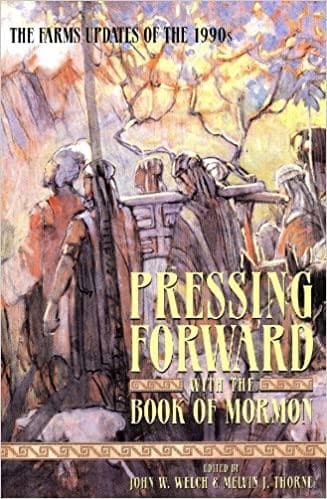Book
69 Chapters

“His blood atoneth for the sins of those . . . who have ignorantly sinned.” (Mosiah 3:11)
In explaining the atonement of Jesus Christ, King Benjamin pointedly states that in addition to atoning for the fall of Adam, “his blood atoneth for the sins of those . . . who have died not knowing the will of God concerning them, or who have ignorantly sinned” (Mosiah 3:11). For modern readers, the notion of sinning unintentionally may seem illogical. Isn’t sin a conscious violation of a commandment of God? If someone transgresses a law of God in ignorance, is there any guilt or culpability that calls for repentance?
Although the modern mind tends to see sin essentially as a bad choice or an evil intent, the ancient mind included many other dimensions in its concept of sin, such as defilement, accident, error, or misjudgment. Impurity could result, for example, from any direct or indirect contact with a corpse, even if the person was unaware of the contact (see Numbers 19:14). Likewise, mistakenly touching the ark of the covenant was erroneous, even if the person had good intentions (see 2 Samuel 6:6–7). In Old Testament times, the concept of sin embraced many nuances of erring, disobeying, missing the mark, bending, rebelling, straying, wandering, or otherwise being at fault, whether consciously or unconsciously.1
In Numbers 15:27–29, the law of Moses prescribes what should be done “if any soul sin through ignorance.” The transgressor must bring a goat for a sin offering and “the priest shall make an atonement for the soul that sinneth ignorantly” (15:28). By way of contrast, if a person who “despised the word of the Lord” sins “presumptuously,” that person shall be cut off (Numbers 15:30–31). Indeed, inadvertence was “a key criterion in all expiatory sacrifice. A deliberate, brazen sinner is barred from the sanctuary.”2
With this background, we may better understand why Benjamin so expressly stated that the atonement of Jesus Christ would atone for the sins of those who “ignorantly sinned.” Benjamin’s people would naturally have wondered, as he described the workings of the promised atonement, whether its efficacy would cover all categories of sin or only certain types of transgressions. They were told that Christ’s atonement would automatically cover the fall of Adam and sins committed in ignorance. Although modern theologies would think of inadvertent sins as being only marginally significant, they stood at the crux of the concept of expiation and atonement in the ancient system of sacrifices. At the same time, Benjamin also pronounced a resounding eternal wo upon the unrepentant who transgress the law of God knowingly, who come out “in open rebellion against God” (Mosiah 2:37; see Mosiah 2:33; 3:12). Forgiveness for intentional misconduct depends on a full change of heart.
Moreover, Mosiah 3 recognizes two types of ignorant sins: (1) some people live and die unaware of the will of God concerning them (3:11) as revealed in the written law of Moses (3:14) and thereby transgress the law, while (2) other people presumably know the law of God in some form but still commit sins accidentally or in ignorance of the law’s true meaning or application.
Interestingly, other ancient people similarly spoke of various types of ignorant sins. The Dead Sea Scrolls punished “a single inadvertent sin” by a small fine (1QS, col. 9, lines 1–2); repeated error was apparently not tolerated. Inadvertence could be due to carelessness or misjudgment, but it could also come from ignorance of the “hidden matters” embedded in the law of Moses known only to the Qumran sect. Of course, one who openly “rebels” against the revealed portions of the law obvious to everyone was very stringently punished (1QS, col. 8, lines 17–18; see 4Q159).3
Unintentional sin was of much greater concern to ancient people than it is to us today. Although we worry very little about such sins, this is only because we know that Christ’s infinite sacrifice has atoned for them. Even though we are now less concerned with unintentional sins, Benjamin’s words remind us that we should not remain ignorant of or ungrateful for this aspect of Christ’s atonement.
Research by John W. Welch, originally published as a FARMS Update in Insights (April 1996): 2.
1. See Gerhard Kittel, ed., Theological Dictionary of the New Testament (Grand Rapids, Mich.: Eerdmans, 1964), 1:269–79.
2. Jacob Milgrom, Leviticus 1–16 (New York: Doubleday, 1991), 228.
3. See Gary A. Anderson, “Intentional and Unintentional Sin in the Dead Sea Scrolls,” in Pomegranates and Golden Bells: Studies in Biblical, Jewish, and Near Eastern Ritual, Law, and Literature in Honor of Jacob Milgrom, ed. David P. Wright, David N. Freedman, and Avi Hurvitz (Winona Lake, Ind.: Eisenbrauns, 1995), 55.
Book
69 Chapters
Items in the BMC Archive are made publicly available for non-commercial, private use. Inclusion within the BMC Archive does not imply endorsement. Items do not represent the official views of The Church of Jesus Christ of Latter-day Saints or of Book of Mormon Central.